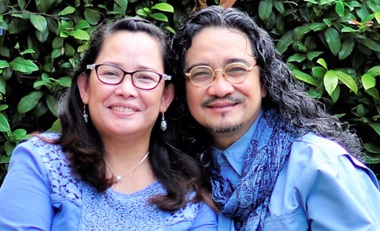
Joji and Dann Pantoja run Coffee for Peace and PeaceBuilders Community Inc. in the Philippines. They were in Vancouver from 1986 – 2006.
The Fourth Lausanne Congress at Incheon, South Korea (September 22 – 28) was a massive affair, with 5,400 participants from 200 nations.
There were so many opportunities to meet and chat – at meals, in the halls, at breakout groups – but the best times came during plenary sessions, when we met with our table groups.
Each day began and ended with plenary session; we sat at more than 900 tables, usually in groups of six. We worshiped and listened to speakers together, but we also had plenty of time to talk, sometimes discussing questions posed from the stage, but also just sharing our backgrounds and experiences.
My table had just four people, as two had been held back due to visa or other issues. They were a Filipino leader of a church network, an Indian national working in the Horn of Africa and a German representative of a non-profit society.
This week I will describe the surprising link between a creative – daring might be a better word – initiative in the Philippines and its founders’ time in Vancouver. Next week I will look at the Indian participant’s moving story about the influence of a British missionary on his family’s fortunes. And then at a bishop’s experience with the burgeoning church in Qatar.
Dann Pantoja / peace builder
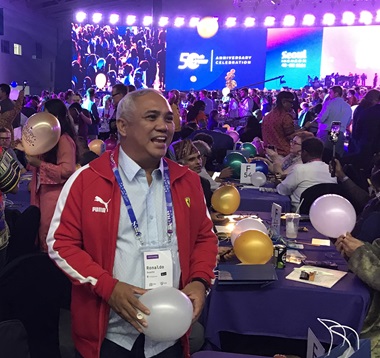
Onie Avante during the 50th anniversary celebration at Lausanne 4.
One day Ronaldo (Onie) Avante was telling us about his ministry in the Philippines. He is National Director of the Christ Jesus Our Life church network.
“As of now,” he said, ” we have planted 204 churches and are starting at least 15 new outreaches in different poor provinces in the Philippines.” They are also considering planting churches in other parts of Asia.
One day while he was talking about the Philippines, he mentioned a man who has over the past couple of decades developed a peace building movement among the Indigenous, mainly Muslim people on the southern island of Mindanao. He knows him personally.
When he mentioned the man’s name, I thought it sounded familiar.
Vancouver connection
In fact, Dann Pantoja used to be a Baptist pastor in Vancouver. Originally from the Philippines, he and his family moved to Canada in 1986.
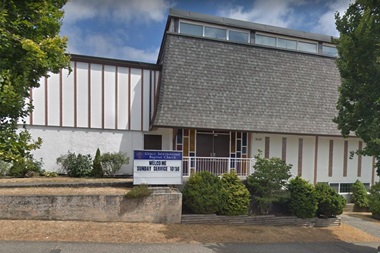
Grace International Baptist Church is on Jasper Crescent in southeast Vancouver.
Dann served as Lead Pastor at Grace International Baptist Church in Vancouver for several years, beginning in 1989. In 1995 he was appointed Director of Global Ministries with the Baptist General Conference of Canada. In 2002, he finished his Master of Theology degree from Vancouver School of Theology.
His wife, Joji Pantoja, worked in the investment and financial industry while in Canada.
They returned to the Philippines in 2006, They write on their website::
We are peace and reconciliation missionaries sent to the Philippines by our home community, Peace Mennonite Church, in partnership with Mennonite Church Canada. We are not in the mission field to create waves of peace. We are in the mission field because The Great Creator is already creating exciting and significant waves of love, joy, peace, justice and hope in the lives of individuals, communities and people groups. We are simply surfing on The Great Creator’s exciting waves!
The site still describes Dann and Joji as “Canadian PeaceBuilding Workers / Philippines.”
Peace Builders
Bishop Efraim Tendero, Global Ambassador of World Evangelical Alliance (WEA) spoke to the plenary session at Lausanne 4, calling passionately for a reformation of the evangelical movement, urging Christ followers to be radical in their discipleship, following Jesus by displaying humility and practicing forgiveness.
Five years earlier, at the Global Conference on Human Fraternity February 3 – 4, 2019 in Abu Dhabi, United Arab Emirates (UAE), Tendero urged “peace building” with Muslims.
During his talk, he spoke of Dann Pantoja:
As an example of how this message impacts Christians who take it seriously, consider Rev. Dann Pantoja, my roommate in Bible school. He eventually migrated to Canada and worked in Christian missions, but the ongoing civil conflicts on the Philippine island of Mindanao tugged at his heart.
Finally, Dann decided to immerse himself in Mindanao and lived with Muslims for six months. He received such a warm welcome that he relocated his family from Canada to Mindanao. Dann and his family have been living there for 10 years now, leading the PeaceBuilders Community, a ministry that actively engages in peace and reconciliation ministry.
One of the previous presidents of the Philippines had a policy of all-out war against the Muslim rebels. Under his rule, the military used its full force to capture the rebel camps, destroying the homes of many civilians in the process. In response, the evangelical churches raised funds and mobilized volunteers to rebuild the homes and even the local mosque.
The Muslim sultan welcomed the evangelicals and declared their area to be a zone of peace. These are actions that a Christian or Muslim community anywhere in the world could take without compromising their faith in any way. When we build bridges through such acts of kindness, any existing misunderstanding or hatred quickly disappears.
Coffee For Peace / PeaceBuilders
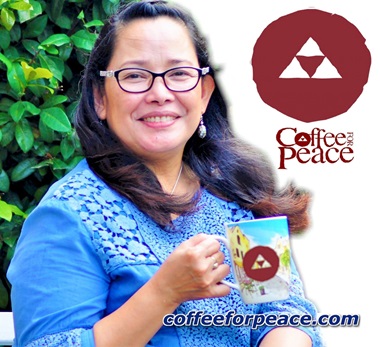
Joji Pantoja looks after Inclusive Business and Financial Management with Coffee for Peace.
The Pantojas describe their “individual missionary tasks [as] distinct and yet inseparable and complementary”:
-
- Joji Pantoja:
To establish Coffee For Peace (CFP) until it becomes a profitable business that would enrich farmers, protect the environment and support peacebuilders.
Coffee For Peace is an inclusive development corporation. CFP is also a community of consultants – conscientious individuals who are passionate about business-for-profit, addressing social issues that concern our farmers, our environment and the peace situation in our land by advocating Direct Fair Trade in the coffee industry.
[We] see the multiplication of social entrepreneurs – the nonviolent, positive revolutionaries – as a socio-economic movement to achieve justice and peace in our society and in our environment.
- Dann Pantoja:
To establish PeaceBuilders Community, Inc. (PBCI) as a growing and self-sustaining ministry in the context of Philippine realities.
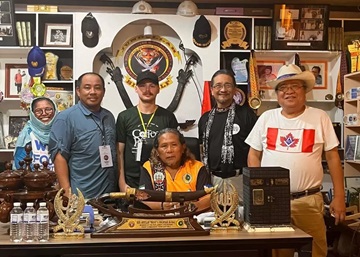
The Coffee For Peace team met with former combatants of the North Western Mindanao Front of the Bangsamoro Islamic Armed Forces.
PBCI trains peace and reconciliation leaders and field volunteers – peace building operatives, conflict transformation specialists and restorative justice practitioners – who are dreaming and working together for a just, radical and active non-violent transformation of our beautiful land.
We normally work in partnership with religious institutions, civil society organizations, political fronts, business corporations and government agencies.
Dann wrote of a trip in April:
Our team was invited to listen to the dreams and aspirations of former combatants at Camp Bilal, the headquarters of the North Western Mindanao Front of the Bangsamoro Islamic Armed Forces. BIAF is the armed wing of the Moro Islamic Liberation Front. The discussions happened at the office of MP Abdullah ‘Cmdr. Bravo’ G. Macapaar. The ideas we were hearing resemble that of inclusive development through social enterprise.
Brother Musa Mohamad Sanguila gave me time to briefly present the story of Coffee For Peace (CFP) and PeaceBuilders Community, Inc. (PBCI) as advocates and practitioners of Social Enterprise. It seems Commander Bravo and those around him, especially Ma’am Naglah Lailah Amenah Sanguila, liked the idea.
Commander Bravo promised to officially invite us to conduct a training on Coffee Social Entrepreneurial Initiative. In Shaa Allah, we will return to start a partnership with this community.
Rev:olutionary
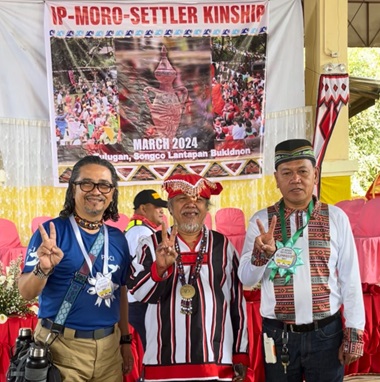
The PBCI-CFP Team travelled to the Ancestral Territories of the Talaandig Indigenous community earlier this year.
While they describe themselves as devoted missionaries, they have clearly taken a more radical path than most.
A description of past instructors by Canadian Mennonite University noted:
The ‘Rev’ before Dann’s name refers more to his being a ‘revolutionary’ than being a ‘reverend.’ He is a plowshare and a pruning hook, transformed and re-shaped from the best spear and sword materials.
And Joji responds to questions about why she left her career in Vancouver:
I can’t imagine having a summary of my life printed on my tombstone as: ‘Spent her life managing rich people’s money.’ I want to be remembered as: ‘A person who walked with the people as they find dignity through sustainable economic development.’
Both Dann and Joji have begun to use their Indigenous Tagalog names regularly – Lakan Sumulong and Lakambini Mapayapa respectively.
Dann wrote of a March 8 visit:
Our PBCI-CFP Team travelled to the Ancestral Territories of the Talaandig Indigenous community to participate in the 12th Affirmation of Kinship among Indigenous Peoples, Bangsamoro and Settlers. As active participants in the tri-people kinship affirmation, we have been privileged to witness firsthand the profound impact of kinship in promoting peace and unity throughout Mindanao.
View of missions
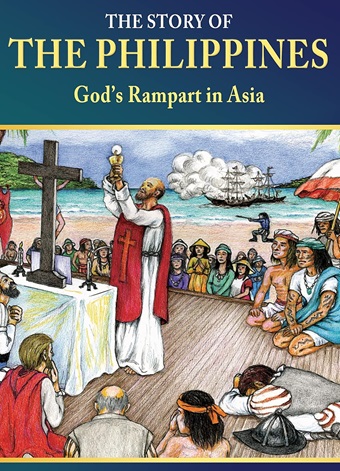 During the summer, Pantoja posted ‘Decolonizing and liberating the Christian missionary enterprise: a personal reflection,’ on the PeaceBuilders Community site. He thoughts were based on his response while meeting in Thailand as part of a group of missionaries sent by Mennonite Church Canada Witness to various parts of Asia.
During the summer, Pantoja posted ‘Decolonizing and liberating the Christian missionary enterprise: a personal reflection,’ on the PeaceBuilders Community site. He thoughts were based on his response while meeting in Thailand as part of a group of missionaries sent by Mennonite Church Canada Witness to various parts of Asia.
He said:
For me, it’s essential for fostering a more just and respectful approach to effective Christian witness. By critically examining past practices, prioritizing local cultures, and aligning missionary efforts with the principles of justice-based peace and reconciliation theology, the Christian mission can become a force for genuine spiritual and social transformation.
And described his view of Christian missions in history:
The Christian missionary enterprise has historically played a significant role in the spread of Christianity across the globe.
However, its legacy is complex, often intertwined with colonialism, cultural imposition and the subjugation of indigenous peoples. As contemporary society grapples with the aftermath of colonialism, there is a pressing need to decolonize and liberate the Christian missionary enterprise to foster a more equitable and respectful approach to faith and spirituality.
He concluded:
By critically examining past practices, prioritizing local cultures, and aligning missionary efforts with the principles of justice-based peace and reconciliation theology, the Christian mission can become a force for genuine spiritual and social transformation. This reimagined approach not only honors the diverse ways in which people experience faith but also promotes a more inclusive and equitable global community.
Controversial, admired
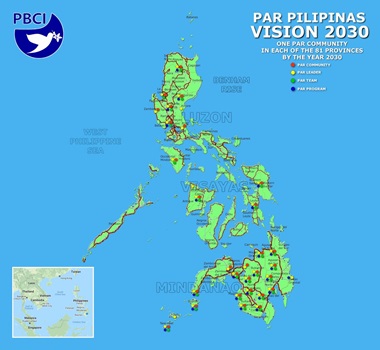
The PeaceBuilders Community aims to have thriving Peace and Reconciliation (PAR) Communities in all 82 provinces of the Philippines by December 31, 2030.
Dann and Joji Pantoja’s story illustrates some of the Lausanne Movement’s ongoing attempts to balance what John Stott (co-founder of Lausanne with Billy Graham) described:
Evangelism and social action are like two wings of a bird. The church cannot fly except with both in action.
There are those who feel that some Lausanne participants – maybe even the movement itself – are veering too far towards the social gospel. Not all would appreciate the Pantojas’ approach.
On the other hand, from its earliest days, some Lausanne leaders (René Padilla and others) have critiqued the missionary movement for its truncated message – too American and too focused on purely personal salvation. That critique remains, especially in Latin America and some other parts of the Global South.
Lausanne 4 did have a wide range of perspectives represented on the stage (not least René Padilla’s daughter, Ruth Padilla DeBorst) – and I think we saw signs of a serious desire for balance at our table.
Onie Avante was supportive of the Pantojas’ work among Muslims, and said in a follow-up email:
I think it was radical for him to really live, dress and spend time with them. But Jesus was also radical when he lived on earth. Pastor Dann’s approach through friendship and showing them love was a way of showing genuine concern. Coffee For Peace gave another option for them by planting coffee and live in peace.
He also told me that Dann’s younger brother Noel Pantoja, National Director of the Philippine Council of Evangelical Churches, was participating at Lausanne 4.
The PeaceBuilders Community is growing. They point out:
As of August 2024, we have introduced Peace and Reconciliation Principles and Practices in 33 of the 81 provinces in the Philippines, [including] 20 provinces in Mindanao . . .
By December 31st, 2030, every single one of the 82 provinces in the Philippines will host a thriving circle of leaders, collectively called Peace and Reconciliation (PAR) Communities. These are not just groups of volunteers – they are catalysts for radical transformation, deeply embedded in their families, churches, neighborhoods, barangays, cities and municipalities.
Dann is clear about what fuels his positive outlook in life:
It’s the influence of Jesus, a 1st century Jewish Palestinian carpenter who was executed by the imperial power of his time. He said: ‘Whoever tries to keep his life will lose it, and whoever loses his life will preserve it.’ Jesus defied death – the ultimate negative factor in our cosmos.
He wrote ‘A Christian understanding of the Moro struggle in Mindanao’ in 2016; it offers a valuable perspective on how he sees his pastoral role.
